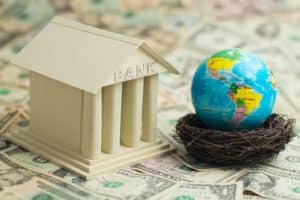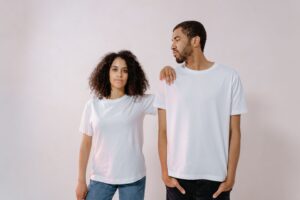Reduce Consumption
Understanding Why We Love to Shop

So I read a blog post the other day where someone was outlining all the different reasons why shopping is such an important part of her life. And I saw a lot of my old self in that article – which sounds condescending, but I mean to say that I really could see where she was coming from with a lot she had to say.
Undeniably we live in a society where consumption is king. We are bombarded every day with marketing. The worst culprit in my mind (perhaps because I just watched The Social Dilemma recently) is social media – can’t go two seconds without an ad popping up in my face.
And it’s very difficult not to fall prey to it.
Why are we such easy prey for marketing? Why do desire to have what others have? What are the factors at play that drive our desire to shop?
I’m no expert on people and the psychology behind shopping however I have been looking into this online and I have picked up a thing or two that I’d like to share. Peppered with my own experience, I want to outline some of the reasons why we love shopping and the potential underlying reasons behind that.
Reason 1: Shopping gives me confidence and reminds me of who I am
A common reason why fashion is such a thing is that the clothes we wear represent who we are to the world. We can say till we are black and blue in the face that appearances don’t matter and by extension, neither do the clothes we wear, but really how many people buy that line? Not many if we are honest.
Shopping for clothes, finding something that looks amazing on you, having something new and fresh to wear just gives you confidence.
And we tend to use clothes to represent who we are. Casual, vintage, sporty, grunge, bohemium, corporate, minimal – whatever it is, the style you adopt represents who you are. Just following from that list you assume from the style of clothes worn that the person is easy going, artsy, athletic, has alternative tastes, nature-loving, hard-working, no fuss.
So we shop accordingly – to feel confident and to portray a certain image to the world.
Why is that so important? It sounds superficial. Surely we are all not just shallow, superficial being.
But why?
Well, I don’t think it’s about being superficial – it just makes practical sense. Especially now in our fast-paced world.
Clothing acts as a shorthand. We go more by symbols and what things represent than we do by deep analysis or insights. We don’t have time to work out your life story, we don’t have time to sit back and evaluate you by your actions – we want to know just by looking at you what tribe you belong to. Are you someone I can connect with or not?
In a 2014 interview with Dr. Kit Yarrow titled Why we shop: The neuropsychology of consumption (will be quoting this one a lot), the Dr mentions:
“….our use of technology has turned us into speed demons when it comes to processing information. We want it fast and therefore rely more on symbols and visual data to inform our perceptions. We also look for symbols to understand other people — what people are wearing, what they own, and what brands they attach to are shorthand ways of understanding and communicating with other people.”
Its no wonder we are not convinced by the idea that appearances don’t matter – we live in a world where (more often than not) what you wear does matter. We know it is a way to signal to other people who we are. We know this because we have looked at others the same way. It’s a way to communicate and connect with people. And connecting to people is just core to who we are.
And the power in what you wear (driving the need to shop) seems higher now more than any other time – we rely on logos, symbols and emojis to convey emotions so it is not too much of an extension to understand that clothing is a shorthand as well – one we use to understand a person and what they stand for at a first glance.
I’m sure it’s not true in all instances but I can understand why this may feel like the case in most situations. And why this can act as a driver behind our desire to shop.
Reason 2: Shopping is how I like to spend time with friends
So there was an argument in the blog post I read that shopping was how the blogger connected with people, it was how she liked to spend time with her friends.
Not sure if I quite get this argument myself since I always shopped alone! But I imagine it must be true for most people.
But why?
So back to Dr. Yarrow who states (concerning Black Friday shopping):
“…I think for many people it’s a tradition. It’s something that they’ve always done. People are off from work that day, and some are with extended family; it becomes an event greater than just shopping. It’s the kick-off to the holiday season: visiting Santa, window decorations, the lighting of the tree. I think the social aspects of it are very important to a lot of people.”
The social element is there again, where shopping is a way to connect to others – this way directly as an activity you do with others, whether it is out of tradition or as an event that you take part in because so many others do the same.
Again, I guess that it is the need for connection with others that drives us – we are innately very social creatures.
In that same interview Dr Yarrow mentions :
“… I would say that buying usually involves relationships in one way or another. The motivation for almost everything we buy has something to do with connecting with other human beings. Even when it comes to practical purchases, the particular brand or product we choose relates to our connections with other human beings.”
This seems to be a big driver.
Reason 3 - Shopping gives me a feeling of control
Another aspect of our love for shopping is the fact that people feel in control when they shop. Shopping is a way of bringing some order back into your life.
Things going haywire at home or work – retail therapy feels good in comparison. You are in control, you decide what you are going to spend your money on. You and you alone are in the driver seat. Compelling.
In the interview with Dr Yarrow she mentions people use:
“….shopping as a way of calming their anxiety. For example, if you’re going through any life-stage transition, from getting married to having a baby, I think shopping is used as a way to mentally prepare and calm anxiety. As people go through the process of selecting products, they are mentally visualizing their new future. In a way, it’s like runners and athletes who use visualization to enhance their performance.”
Seems like shopping is a way of bringing some certainty back into your life, especially if you are going through situations where the future is unclear or not so certain.
But why?
I wanted to know why is it that we seek certainty in our lives. But frankly, that’s a deep hole and I would need a lot more time to explore that issue.
But for now, here is some information I found on changingminds.org that I found interesting. It explained:
“From an evolutionary standpoint, if we are in control of our environment, then we have a far better chance of survival.”
We are kinda wired to desire control it seems? Its what we have been programmed to seek out because way back when that is what we needed to survive.
I’m not sure how much weight these evolutionary explanations have but it is something I am interested in exploring later.
Suffice to say, the need for control seems innate and shopping provides some people with a measure of control in their lives, or at least the illusion of control, when all else seems uncertain.
Reason 4: Shopping happens when I lose control
Here’s a good one when it comes to shopping that flips the last one – we shop out of a loss of control.
How does this work? Its when you don’t know what takes over you, you shop and shop and shop, hunting down bargains, using a heap of time and energy to get the best deal or nab that highly sought after item. Its where you kill three hours of your life shopping and you don’t understand why and you totally regret it afterwards (yes, I’m talking from experience here).
Its where you get lured in by the promise of a great deal and you act like a hunter, out to get an even better deal. And hours pass until you finally achieve your goal.
And you just hate yourself afterwards for it, bemoaning the waste of time and money.
Again from the interview with Dr Yarrow:
“Shopping has also been linked with amygdala activation, suggesting an emotional component to shopping…. When it comes to Black Friday, I’d say the biggest threat to shoppers would be what happens to our bodies when we get in stressful situations — that is, the autonomic nervous system arousal that accompanies being in crowded, stressful places or experiencing a fear of missing out. Shoppers often get home and wonder why they bought what they bought. They weren’t thinking logically amidst the hyperarousal and stress.”
But why?
Why do we have this fear of missing out?
In a blog on Why Shopping Makes You Feel High, published by neurotrackerx.com they mention:
“During a sale, the body’s autonomic nervous system (the system that triggers our fight or flight response) reflexively takes control of some organs. As a result, a heightened response in the body is created, similar to the one early humans had when encountering predators. It can be difficult to control your impulse to buy an attractive item, when your brain is switched into “competitive mode.” This occurs due to the fear of missing out on a purchase; if you don’t buy it, someone else will. Known as the loss aversion theory, sales drive a compulsion to buy an item, because it presents the threat of a loss. As a result, we irrationally overvalue losses approximately twice as much as gains.”
So here it is again, an evolutionary factor to explain or current behaviours. Behaviours and responses that make sense in the context of survival in the jungle but seem to make very little sense to the way we are living now.
Even less sense when the instinct comes up in our shopping habits – I chased that deal and brought things I later regretted because my automatic nervous system took over? Argh.
Reason 5: Shopping makes me feel good and is how I reward myself
Shopping is just fun and makes you feel good. It may be a combination of reason 1, 2 and 3 – added confidence that clothing gives, the social element to shopping and the feeling of control it gives – but even if those reasons don’t exist, it’s just plain old fun.
And a way that people like to reward themselves – using their hard-earned money to purchase something shiny and new and highly sought after. I mean why else do we work so hard?
But why?
Why is shopping so much fun? Why do we feel that purchasing a new dress or pair of shoes (when we have dozens at home) is a reward?
It was clear to me based on what I had read to date that shopping gives you a dopamine hit.
As explained in the blog post on Why Shopping Makes You Feel High:
“In general, dopamine receptors are activated when you experience something new, exciting or challenging.
Dopamine is a neurotransmitter that helps control the brain’s reward and pleasure centres. It enables us not only to see rewards but to take action to move toward them.”
Shopping is new – it’s about attaining something new. So dopamine is released when we shop.
And apparently, it happens not only when we shop, but also in anticipation of shopping:
“A lot of us are not necessarily addicted to the things we buy, but rather to the thrill of the hunt. MRI studies of brain activity suggest that surges in dopamine levels are linked much more with anticipation of an experience, rather than the actual experience.”
Confirmed in another blog on psychologytoday.com (regarding anticipation of something new being enough to trigger a dopamine release):
“Many people think that dopamine is released when the brain receives a reward, but dopamine is actually released in anticipation of a reward. It’s the dopamine that keeps the monkey pressing the bar until the treat arrives.”
So it is the act of shopping – not the actual act of purchasing an item – that triggers a dopamine release. And it’s not something we can control.
Well, strike that last comment. We do have control over how to seek out dopamine releases. We can control how we react to flight or fight triggers. We can address these apparent “uncontrollable” urges.
But its something I need to think on and cover later.
Hope you got something out of this. There’s only so much that can be covered in one blog post but more content is sure to come.
Please sign up below to show your support or head over to my Instagram page and send me a DM to let me know your thoughts.
xxx Tahsin





I really appreciate the insight in your post. I can definitely relate to the idea that buying things can create a temporary feeling of happiness or satisfaction. I think it’s interesting, though, because sometimes I wonder whether the “feel-good” moment is more about the act of acquiring something new, or if it’s tied to the sense of control or excitement that comes with it.
I’ve noticed that, while buying things can give me a short-term boost, that feeling doesn’t always last long. It makes me think about what other ways I can cultivate that same sense of joy—without relying solely on material things. Maybe it’s more about the experiences we create, or the emotional fulfillment from connections and personal growth?
Has anyone else experienced this? I’d love to hear if you’ve found any deeper sources of happiness that go beyond shopping!
Hi Alan, I know your comment was from MONTHS ago – I’m afraid I’m not so active on my blog anymore, posting once a month and clearly not staying on top of comments posted. I write this post about shopping additions around 3 years ago when I was just pulling myself out of it. Part of what helped me was writing the blog post – it helps to understand the different things that may be driving my shopping addiction. It’s hobbies/learning something new that has helped me get out of it (kinda). I say kinda because I feel like my hobbies suck me into consumption (currently learning how to fix things around the home myself and I spend way too much at the hardware store!). Can’t seen to avoid consumption. But it seems more mindful and purposefilled now. If this message reaches you, would love to know what made you think about this topic? Would you say you are a shopaholic?